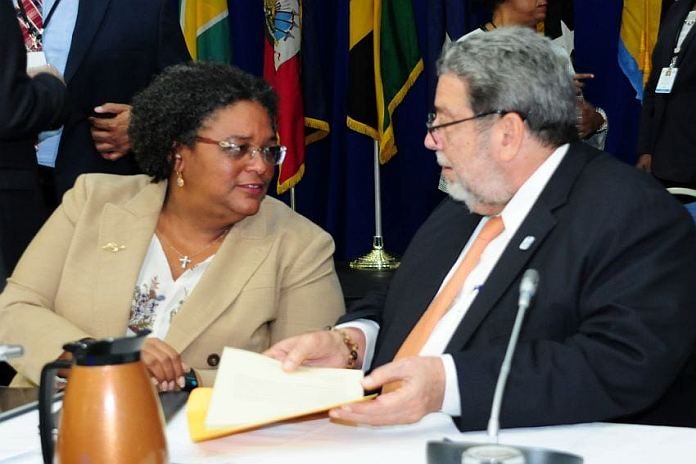By Cathy Lashley
BRIDGETOWN, Barbados (BGIS) — CARICOM chair, prime minister Mia Amor Mottley called on her fellow leaders to continue their work at unifying the region in spite of the challenges that lie ahead, delivered remarks at the opening session of the 31st Intersessional Conference of heads of government of the Caribbean Community (CARICOM).
“We have come from a movement across this region in the 1930s, where we face common challenges and where our people, without the benefit of political organization or labour movements, found a way to respond and to be able to signal that we were prepared to take control of our destiny.
“I say to us today that if those who had no benefit of political organization and … no benefit of labour movement could find it possible to rise to the challenge to meet those challenges, which, in some instances, were far more devastating to the average citizen than these that we speak of today, that we ought to be able to find the resolve to understand that we meet here today not because we share a common ideology, but … because we are family – we are kith and kin,” said Mottley.
Questioning whether the appropriate governance and funding models to ensure the sustainability of CARICOM and the prosperity of citizens were in existence, she noted that the CARICOM secretariat was now underfunded to the tune of EC$30 million, less than it was ten years ago, and understaffed, with 40 people less than it had 30 years ago, but yet it was being called upon to do more.
Mottley queried whether this was not the time to re-introduce the 2003 Rosehall Declaration in Jamaica, which led to prime minister Ralph Gonzalves leading a prime ministerial sub-committee on the issue of governance, so as to ensure effective execution and seamless implementation of decisions taken by heads of government at the highest decision-making body within CARICOM.
Consequently, prime minister Mottley asked prime minister Gonzalves to develop a modality and working groups that could more effectively implement the decisions taken by heads of government, particularly in relation to the CARICOM Single Market and Single Economy.
“I’m equally conscious that in life we have to be able to explain to people that in this modern world where everyone expects instantaneous action that we are involved in an activity that more often than not is about respect for the process, in order to attain the results that we want. It is against that background that we continue to labour in the vineyards of being able to create a more seamless opportunity for doing business, and moving and living and enjoying this region for our people,” she noted.
CARICOM leaders will continue their deliberations before ratifying their decisions ahead of their regular conference in July.





